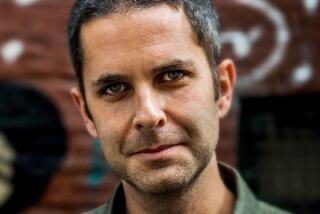Eight days of the ghostwriter
- Share via
WHAT would you do if you could possess everything you wanted -- wealth, power, notoriety -- except the one true love of your life?
This is the question that frames Helmut Krausser’s novel “Eros,” which details one Alexander von Brucken’s pursuit of Sofie, a girl he meets in a World War II bomb shelter during a raid on Munich, where his father owns an armament factory. Such was Von Brucken’s attraction to Sofie that he began to look forward to the attacks with lustful anticipation. “The war came at just the right time for me. It was like a dark friend you conceal from your parents, a friend you meet in secret, with secret signs.”
But Sofie is no trembling virgin, and she cons young Von Brucken into paying her the princely sum of 100 marks for a single, chaste kiss. The scene is rendered with the preposterous precociousness that comes with enormous privilege and makes for entertaining reading, but if Krausser was shooting for a retelling of Eros and Psyche, he’s fallen well short of the target.
Germany loses the war, and the novel takes several dark turns: Sofie is sent away, Von Brucken’s father goes mad and his family is then killed during a raid. Von Brucken escapes to Italy, where he ekes out a feral existence in a fisherman’s shack. The wild child is soon discovered and returned to Munich to reclaim his rightful place as his father’s heir.
This fairy tale is told over the course of eight days to an unnamed author whom Von Brucken has hired to write the story of his quest for Sofie. Although long stretches of the story are related from this author’s point of view, he’s little more than a device. Von Brucken, however, has lots of useful advice for his ghostwriter: “You’re going to write a novel, not my biography. If you find the fisherman too picturesque, make him a potter, it doesn’t matter.”
Or does it? Are these meta-fictional passages intended to call Von Brucken’s credibility into question, or are they just lazy writing? All too often Von Brucken and the unnamed author call to mind a producer and a screenwriter in a pitch meeting: all broad strokes and cues for string music with the details to be filled in later. (Two of Krausser’s previous novels have been made into films, and one wonders whether the possibility of a third was on his mind here.)
Why would such a rich and powerful person hire a novelist to document the one thing he failed at over and over again? Obsession doesn’t choose its subjects, Krausser seems to be saying. The problem here is that the inspiration for Von Brucken’s infatuation is so fleeting and ephemeral it doesn’t stand up to close scrutiny. Both novels -- the one Von Brucken imagines and the one the reader holds in his hands -- suffer for it.
More to Read
Sign up for our Book Club newsletter
Get the latest news, events and more from the Los Angeles Times Book Club, and help us get L.A. reading and talking.
You may occasionally receive promotional content from the Los Angeles Times.








